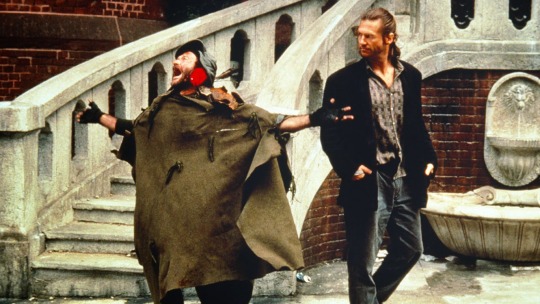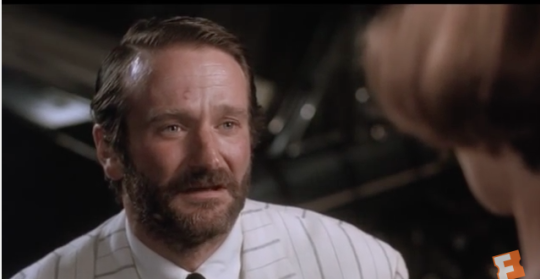On Robin Williams in “The Fisher King” by Scott Tobias
By Yasmina Tawil

It’s been nearly a year since Robin Williams took his life, finally succumbing to the depression he had masked so successfully in comedy for decades. But I’ll confess something now that I (and many other critics) couldn’t then: I rarely looked forward to a Robin Williams movie. There’s some irony to the fact that eulogizing Williams brought his critics closer to the father he played in one of his best movies, World’s Greatest Dad, who answered the predicament of losing a difficult, disappointing son to auto-erotic asphyxiation by re-imagining him as far nobler figure than he was. Directed by Bobcat Goldthwait, one of Williams’ closest friends, the film ultimately argues that acknowledging the full, painful, complicated truth about the boy is better than comforting fabrications, but it also understood the impulse to remember the dead in the best possible light. It would have been callous to express any ambivalence about Williams so soon after his death, because he was a human being first—and by all accounts a sweet and decent one at that—and frank discussions of his artistic legacy could wait.
Yet in the process of eulogizing Williams and taking stock of his entire career on screen, it was actually helpful for me to stop rolling my eyes at Mrs. Doubtfire or Bicentennial Man or Patch Adams, and try to understand what qualities he brought to his best work and why audiences loved him so much. Sometimes, the effort to find the good in an artist’s work can be productive, because you can cast aside your assumptions and get a fresh understanding of his intent. Does that mean I’m ready to embrace those movies that succumbed to his signature fusion of breathless comic improvisation and drippy mawkishness? No. And I’d still assert that the manic persona Williams adopted for mainstream movies and public appearances was not funny, and functioned almost like a smokescreen to guard against the truer, more discomfiting pain (and humor) that wasn’t fit for the masses to see.
Much of that pain—and the mania, too—is on display in Terry Gilliam’s The Fisher King, which features not only one of Williams’ best performances, but also one that accommodates the full range of what he had to offer. In his more serious roles, Williams had a tendency to close the tap entirely on his comic side and it made him seem more limited as an actor, like he was actively repressing an aspect of himself that made him more fully human. In The Fisher King, we see him leap onto a table and zip down his pants in an impish fit of pique and we see him gaze through the window at a Dim Sum restaurant, considering the fumblings of a lonely, “mousey” accountant as if she was God’s most precious creation. As Gilliam himself said of the film in the wake of Williams’ suicide: “It is the whole breadth of Robin, which no other part I think out there does. From the hysterically funny to the manic to the utterly sweet to the sensitive and tormented, it’s all there.”
Rather than look at the whole of Gilliam’s typically dense urban fairytale, I want to focus on a single scene that I consider the best in Williams’ career, but first a little context. Jeff Bridges stars as Jack Lucas, a New York City “shock jock” whose on-air callousness leads to tragedy when he inspires a caller to open fire at a “yuppie” restaurant. Three years later, he encounters Parry (Williams), a homeless former professor whose wife was killed that night, a trauma that sent him first into catatonia and then to a life on the streets. Jack seeks redemption by helping Parry on several fronts, including his courtship of Lydia (Amanda Plummer), an accountant whose every move Parry finds unaccountably enchanting. Jack and his girlfriend (Mercedes Ruehl, whose every move I find enchanting) go to extraordinary lengths to bring Parry and Lydia together, and their efforts pay off in a night out where they connect like long-lost soulmates.
This brings me to the scene, where Parry is walking Lydia home and the two talk out loud about where that might lead. It is Lydia’s expectation that Parry will walk her to her doorstep. It is Lydia’s expectation that she will invite him up for coffee. It is Lydia’s expectation that they will have sex and it will be great, but the next morning he’ll seem distant—again over coffee—and for the rest of the day, she will realize that he never intends to see her again. She has these expectations because she’s that mousey woman from accounting and on the off-chance that anyone takes a romantic interest in her, he will surely not find her special enough to stay for more than one night. This probably doesn’t stop her from wanting Parry to come up anyway—salving her loneliness and desire, if just for a few hours, is worth the pain of having her assumptions confirmed. She’s so certain, in fact, of what’s going to happen that she doesn’t hear him say, repeatedly, “I don’t like coffee.”
Then Parry says this: “I’m in love with you.” And this is how Williams looks when he says it:

Parry has completely disregarded social protocol. This is not something that’s said after a first date. And the way he explains himself afterwards to Lydia could earn him a restraining order. He talks about how he’s been watching her and her daily routine: How she gets bounced around in the crowd when she leaves on her lunch break, how she picks up romance novels on good days, how she orders the same dumplings on Wednesday and eats a jawbreaker before going back into the office. In other words, he’s been stalking her, and though the screenwriter, Richard LaGravenese, has written a beautiful monologue, there are not many actors who could make it sincere and moving rather than chilling. Parry is confessing a romantic obsession that often manifests itself as violence, here in the same city where Travis Bickle made an angel out of a pretty campaign volunteer.
And yet it plays. LaGravenese’s words take it much of the way, but the non-verbal aspect of Williams’ performance in the scene is what really sells it. This is particularly surprising for a man known for his excessive verbosity, but Parry’s absolute sincerity comes across in Williams’ eyes—gentle, pleading, bottomless in their affection. Like anyone else, Lydia wants someone who notices her, who sees and appreciates aspects of her personality that eludes other people. It’s bracing (and a little freaky) that Parry has reached that level of appreciation so quickly, without the weeks and months of courtship that go into a normal relationship. But starting with that shot across the bow, “I’m in love with you,” Williams fights the uphill battle of convincing Lydia (and the audience) that Parry can abandon social mores, be completely honest about how he feels, and get away with it. Parry sees something in her, and we see something in Williams, too, because he’s taken away the barriers of shtick that mar his worst performances and given us a true window into his soul. And now that he’s no longer with us, that window is the only one we’ve got.

